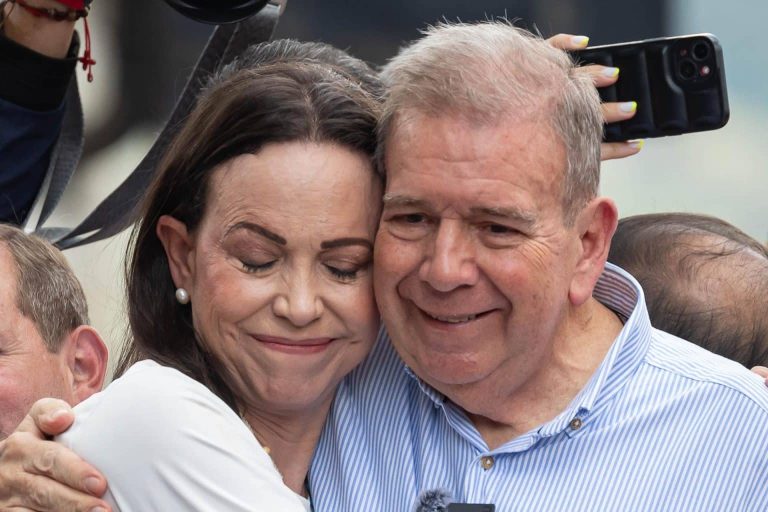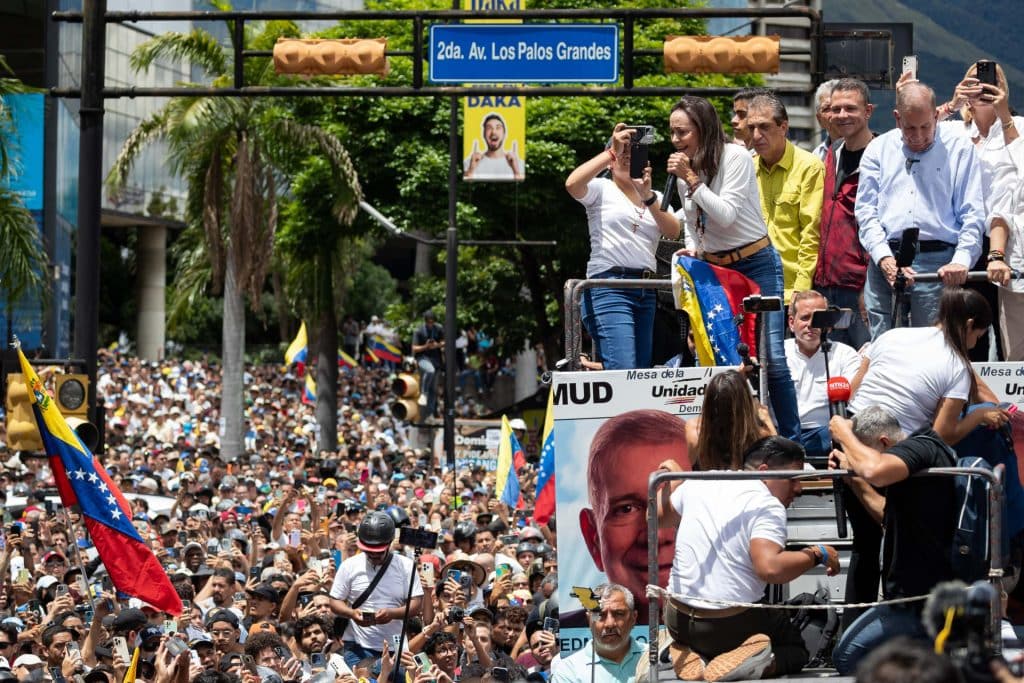4 de agosto 2024

Children of Exile: The Births “Sowing Hope” in the Camp of Nicaraguan Farmers

PUBLICIDAD 1M
PUBLICIDAD 4D
PUBLICIDAD 5D
“Maduro did not win the Venezuelan presidential elections on Sunday. He lost overwhelmingly,” says Maria Corina Machado, now in hiding

Venezuelan opposition leader María Corina Machado (left) embraces Venezuelan presidential candidate Edmundo González at a rally on Tuesday, July 31, 2024, in Caracas, Venezuela. Photo: EFE/ Ronald Peña R.
US Secretary of State Antony Blinken issued a statement asserting that based on “overwhelming evidence,” that opposition leader Edmundo Gonzalez was the winner of the presidential elections on July 28, 2024, in Venezuela.
Thus, on Thursday, August 1, the United States became the second country to recognize the opposition’s victory, following Peru earlier in the week.
Venezuelan electoral authorities announced on Sunday night that with 80% of the votes counted, President Nicolás Maduro was the winner with 51.2% of the votes. They have yet to provide a complete count by polling station, raising suspicions of fraud by the Venezuelan opposition, the United States and many other countries. The United States had shown caution until seeing the detailed data by polling station in the hands of the opposition, which Maduro’s electoral authorities have not provided.
“Given the overwhelming evidence, it is clear to the United States, and especially to the Venezuelan people, that Edmundo Gonzalez Urrutia won the majority of votes in the Venezuelan presidential elections on July 28,” said Secretary of State Anthony Blinken in a statement issued.
The United States called on the parties involved in the Venezuelan crisis to address a transition that respects the electoral outcome’s wishes and said it would support a process to “restore democratic norms” in the South American country.
Maduro responded that “the United States should keep its nose out of Venezuela because the sovereign people rule in Venezuela, the ones who put, elect, say, and decide,” in a statement broadcast by the state channel VTV.
At the beginning of the week, the United States requested to see the records by polling station before making a statement and has been in contact with Brazilian president Luiz Inacio Lula da Silva. In a phone call to Lula da Silva, President Joe Biden and the Brazilian leader requested transparency and detailed results from Maduro’s government.
As the days pass, more regional leaders have joined calls for Maduro to acknowledge his defeat and initiate a democratic transition process in the country.
From Bogota, Colombian President Gustavo Petro reported that he spoke with his Chilean counterpart, Gabriel Boric, to “strengthen” the group of countries formed by Colombia, Brazil, and Mexico, which seeks a “political solution” in Venezuela and calls on the authorities to publish the “voting data by polling station” from last Sunday’s elections.
“Once the statement was issued, I spoke with President Boric of Chile to strengthen this Latin American group,” Petro wrote on his social network, adding that his counterparts in Brazil (Lula da Silva) and Mexico (Andrés Manuel López Obrador) are working on the “search for a political solution in Venezuela.”
Petro referred to the statement the three governments (Colombia, Brazil and Mexico) published hours earlier, calling on Venezuelan electoral authorities to “expeditiously” publish the “data by polling station” from Sunday’s elections, in which the CNE declared the current president, Nicolás Maduro, the winner, a decision questioned by opponents and part of the international community.
In a joint statement, the three emphasized that electoral controversies should be resolved through “institutional” means and that the principle of popular sovereignty should be respected through the “impartial verification of the results.” They also called on political actors to act with “utmost caution and restraint” to prevent “an escalation of violent incidents” after at least eleven deaths and hundreds of detainees were reported.
Both Lula da Silva, Petro, and Lopez Obrador have avoided recognizing the results without severing ties with Maduro’s administration. The three abstained or avoided participating in a vote of an Organization of American States (OAS) resolution calling, among other things, for the immediate publication of the records from each polling station.

Opposition leader Maria Corina Machado said she feared for her life in a column written from hiding and published in the The Wall Street Journal, in which she claimed to have evidence of Nicolas Maduro’s electoral defeat.
“Mr. Maduro did not win the Venezuelan presidential elections on Sunday. He lost overwhelmingly to Edmundo González, 67% to 30%. I know it’s true because I can prove it. I have receipts obtained directly from more than 80% of the nation’s polling stations,” the politician said.
“I am writing this in hiding, fearing for my life, my freedom, and that of my fellow compatriots, due to the dictatorship led by Nicolás Maduro,” she indicated, warning that “I could be captured while writing these words.”
Before recounting the events following Sunday’s elections, she noted that most of her team is also in hiding, six of them asylum seekers at the Argentine embassy now protected by the Brazilian government, and she calls on the international community to act against Maduro’s “manifestly illegitimate” government.
Regarding the announcement by the National Electoral Council (CNE) that declared Maduro the winner, Machado claimed that he did not win in any of Venezuela’s 24 states, according to “four different quick counts,” “two independent exit polls,” and “every vote tally receipt we saw arrive in real time.”
The opposition leader emphasizes that the voluntary witnesses at the polling stations were subjected to “neutralizing” actions ordered by Maduro, but “protected the receipts with their lives during the night” so that on Monday, they could “confirm the mathematical certainty” of Gonzalez’s victory.
While the opposition published these results on the website https://resultadosconvzla.com/, the CNE, which was obligated to publish its results no later than 48 hours after the elections, “quickly closed” its website due to a supposed cyberattack they said came from North Macedonia, she noted.
Machado ends her letter by denouncing Maduro’s “brutal repression” of protests following the results, counting 20 dead, 1000 detained, and 11 forced disappearances by state security forces. She also made a call to the international community.
“The Venezuelans did our duty. We voted to oust Mr. Maduro. Now it is up to the international community to decide whether to tolerate a manifestly illegitimate government,” said the opposition leader, calling on those who reject authoritarianism and support democracy to join the Venezuelan cause.
In his statement, Blinken reiterated that he considers the count presented by the opposition, led by Maria Corina Machado, valid, representing 80% of the polling stations and showing that Gonzalez “received the majority of votes with an insurmountable margin.”
Blinken recalled that the voting records were “received directly from polling stations throughout Venezuela” and corroborate exit polls and the conclusions of independent observers and quick counts.
“Since the election day, we have consulted extensively with partners and allies worldwide, and although each country has taken different paths in response, none has concluded that Nicolás Maduro received the majority of votes,” concludes the head of US diplomacy.
Blinken recalled that the CNE’s “quick” declaration that Maduro won on Sunday “came without any supporting evidence” and that the body “has not published the detailed data or any records yet,” despite international calls to do so.
The Secretary of State pointed out that the accredited Carter Center’s observation mission “has stripped all credibility from the results announced by the CNE.” The Venezuelan opposition determined, based on independently obtained vote tally sheets, that Edmundo González received about 67% of the votes, compared to around 30% for Maduro.
This article was published in Spanish in Confidencial and translated by Havana Times. To get the most relevant news from our English coverage delivered straight to your inbox, subscribe to The Dispatch.
PUBLICIDAD 3M
Agencia de noticias internacional con sede en Madrid, España. Fundada en Burgos durante la guerra civil española en enero de 1939.
PUBLICIDAD 3D